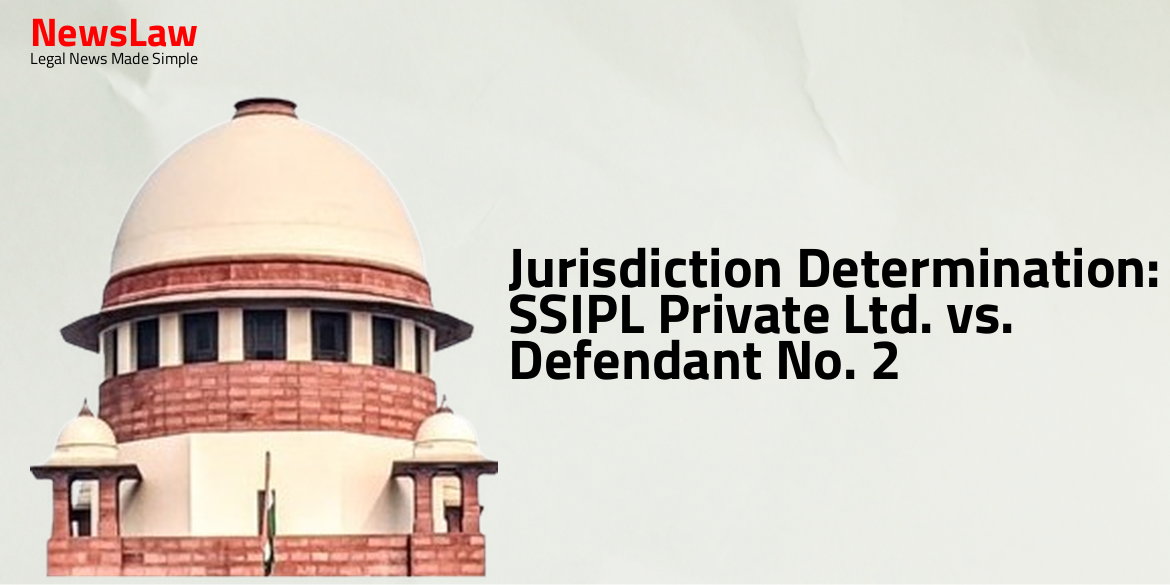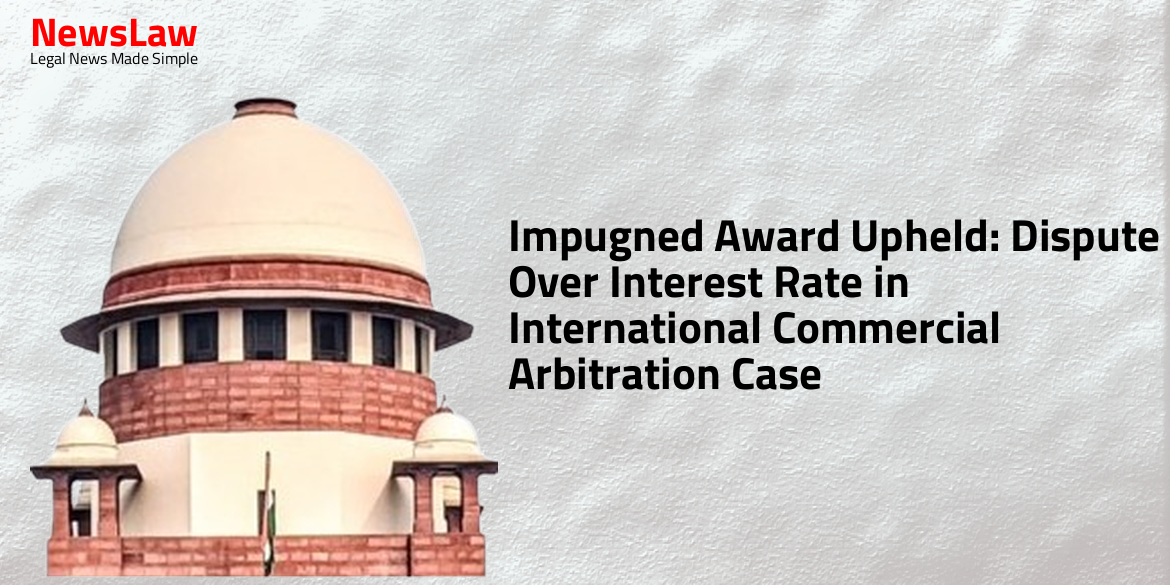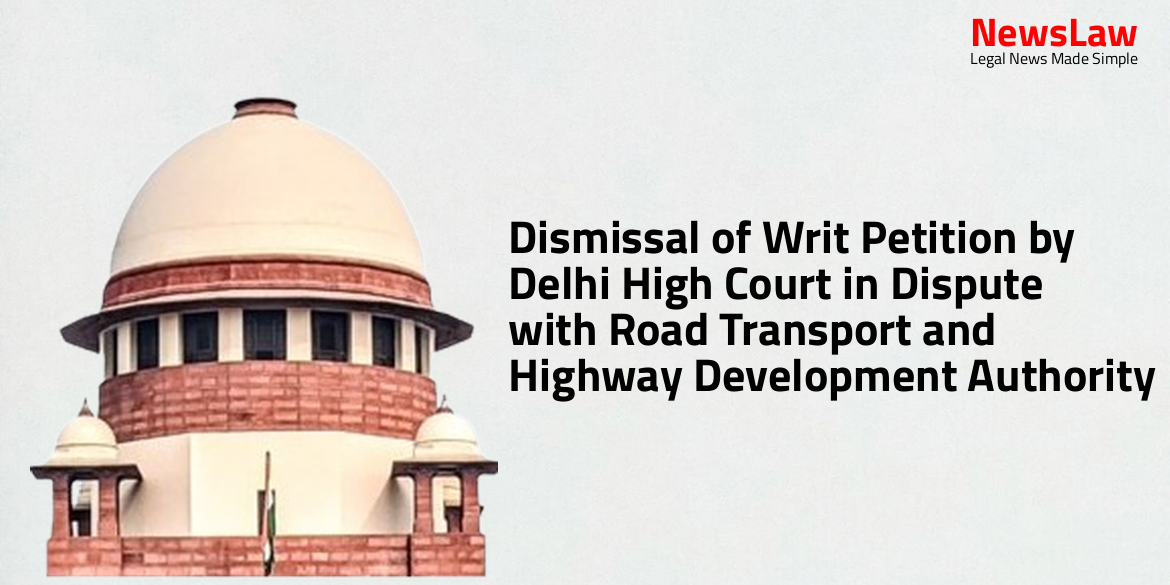The Delhi High Court recently handed down a significant judgement on jurisdictional matters in the case involving SSIPL Private Ltd. and Defendant No. 2. The dispute arises from outstanding invoices and refund claims based on agreements dating back to April 2016. The court grappled with the issue of whether the exclusive jurisdiction clause favoring Mumbai Courts in the agreement prevails over subsequent actions and novations. The ruling sheds light on the complexities of determining jurisdiction in commercial contracts. Dive into the details to unravel the intricacies of this legal battle.
Facts
- Two suits were filed on 17.02.2018 seeking recovery towards outstanding invoices, refund of security deposits, and losses and damages caused.
- Defendants seek return of the suit for want of territorial jurisdiction citing an Agreement with a clause specifying Mumbai Courts exclusively.
- Suits filed by SSIPL Private Ltd. and SSIPL Retail Ltd. for recovery based on Agreements dated 22.04.2016 for supply of products under various brand names.
- Defendants challenge jurisdiction of the court and request return of plaints under CPC Rule 10 with direction to present to Mumbai court.
- Issues arose between parties regarding outstanding dues leading to the defendants seeking refunds in August 2017.
Issue
- The core issue in this case revolves around the jurisdiction clause printed on the subsequently generated Invoices and its supremacy over the exclusive jurisdiction Clause 32 (Mumbai) of the Agreement dated 22.04.2016.
Arguments
- The plaintiff argues that the jurisdiction of this Court is vested in this matter due to various reasons.
- The defendants failed to file a Written Statement and their right to do so has been struck off.
- Applications under Section 8 of the Arbitration and Conciliation Act were filed by the defendants to oust territorial jurisdiction, but were addressed by the plaintiff.
- The Exclusive Jurisdiction Clause in the original Agreement has been completely novated.
- The court has dismissed an Application under Section 8, stating the disputes are not arbitrable.
- The plaintiff claims that the novation/rescission of the previous Contract was due to low sales by the defendants.
- The defendant argues that the original Agreement dated 22.04.2016 is still binding and the jurisdiction lies with Mumbai Courts.
- The defendants state that the principal place of business of the plaintiff is in Mumbai.
- The Mumbai Courts are claimed to have exclusive jurisdiction as all actions from contract formation to execution took place in Mumbai.
- The claims of the plaintiff do not pertain to the Contract dated 22.04.2016
- The Contract has been terminated
- Jurisdiction for the maintainability of the Suits depends on where the cause of action has arisen and as mentioned in the Invoices
- The Court has territorial jurisdiction based on the above points
- The application is without merit and liable to be dismissed
Analysis
- Defendant No 2 acknowledged misrepresentations, making the Addendum and Agreement dated 22.04.2016 legally voidable.
- The novated Understanding/Arrangement from July 2016 had key changes including removal of minimum guarantee amount, no lock-in/assured payment, and terminable relationship.
- Jurisdiction of Civil Courts determined by Section 9 of CPC, 1908 unless expressly or impliedly barred.
- Exclusive jurisdiction clause in the Agreement favored Mumbai Courts for dispute adjudication.
- Presence of ‘consensus ad idem’ crucial to uphold jurisdiction clauses.
- Exceptions to exclusive jurisdiction clause include oppression or inconvenience to parties.
- Provisions from Section 15-20 of CPC, 1908 crucial in determining jurisdiction based on case nature, pecuniary value, territorial limitation, and cause of action.
- No ‘jurisdiction clause agreement’ found in the printed material issued, thus not binding.
- Judicial precedents highlighted categories of cases based on presence or absence of jurisdiction clauses in agreements.
- Despite novation attempts, exclusive jurisdiction clause remained binding to Mumbai Courts.
- Novation efforts led to fresh understanding, but original Agreement terms remained partially novated.
- Issuance of Invoices indicating Delhi Courts’ jurisdiction without full consent questioned.
- Four exceptions identified to exclusivity of jurisdiction clause based on ignorance, practicality, competent court, and concurrence of parties.
- Exclusive jurisdiction clauses are often included in contracts to limit legal proceedings to one specified place.
- Section 28 of the Indian Contract Act, 1872, makes agreements in restraint of legal proceedings void.
- Exclusive jurisdiction clauses cannot confer jurisdiction to a court that is not competent according to the provisions of CPC, 1908.
- If two or more courts have jurisdiction, parties can agree to limit the trial of disputes to the jurisdiction of one court through an exclusive jurisdiction clause.
- Clauses using words like ‘alone’, ‘only’, ‘exclusive’, indicate a clear intention to limit jurisdiction to one court.
- Parties may agree on an exclusive forum for dispute resolution, either explicitly or through necessary implication.
- In the case of Secretary Vikalanga Sevaka vs. Sheth, the concept of ‘consensus ad idem’ was emphasized in relation to conferring, ousting, or limiting the jurisdiction of Courts.
- Court highlighted that for a clause in a contract to be binding regarding jurisdiction, there must be a mutual agreement (consensus ad idem) between the parties.
- The Suit was filed in Calicut due to payments made through RTGS into the plaintiff’s bank account at IDBI Bank Park Street Branch.
- It was considered challenging for the Court to determine ‘consensus ad idem’ if a form was only signed and delivered by one party without engagement from the other.
- In the case of United India vs Associated Transport, it was held that printed words in an ouster clause without mutual affirmation were insufficient to bind the parties.
- The Court observed that for a printed form to confer exclusive jurisdiction or oust the jurisdiction of another Court, it should be signed by both parties or forwarded and affirmed by the parties involved.
- The judgment of Shridhar Vyapaar Private Limited vs Gammon India Limited highlighted the importance of the parties’ intention to exclude the jurisdiction of other Courts and confer exclusive jurisdiction on a specific Court.
- It was ruled that the expressed exclusive jurisdiction clause gave exclusive jurisdiction to Raipur and Nagpur Courts, rendering the Suit filed in Calicut to be without territorial jurisdiction.
- The Court stressed the need for caution in adjudicating jurisdiction issues, especially when a clause is part of a printed form.
- The exclusive jurisdiction clause in the original Contract is binding and valid, as it reflects the intent and affirmation of the parties.
- Merely printing a clause on invoices without explicit agreement by both parties does not modify the original jurisdiction clause.
- The court lacks territorial jurisdiction to entertain the present suits due to the exclusive jurisdiction clause agreed upon in the original Contract.
- The disputes in the present case are not related to the original Contract, as determined during the application under Section 8 of the Arbitration and Conciliation Act 1996.
- The plaintiff’s case does not fall within the exceptions outlined in the Shridhar Vyapaar Private Limited case.
- There are no allegations in the plaint regarding inconvenience, feasibility, or lack of consent to the exclusive jurisdiction clause in the original Agreement.
- The defendants are not barred from raising objections regarding territorial jurisdiction after the dismissal of the application under Section 8 of the Arbitration and Conciliation Act 1996, even without a written statement on record.
- The original Agreement dated 22.04.2016 remains binding as it was never rescinded or novated in its entirety, with only three clauses being amended later through an Understanding.
Decision
- The court has determined that it lacks territorial jurisdiction to decide on the applications CS(COMM) 735/2018 & CS(COMM) 736/2018.
- The applications are dismissed with the option to refile in the court of competent jurisdiction.
- The Suits are directed to be returned for presentation in the appropriate court.
- The Applications under consideration are to be returned to the plaintiff for filing in the Court of appropriate jurisdiction.
Case Title: SSIPL LIFESTYLE PRIVATE LIMITED Vs. VAMA APPARELS (INDIA) PRIVATE LIMITED & ANR. (2024:DHC:4140)
Case Number: CS(COMM)-735/2018



